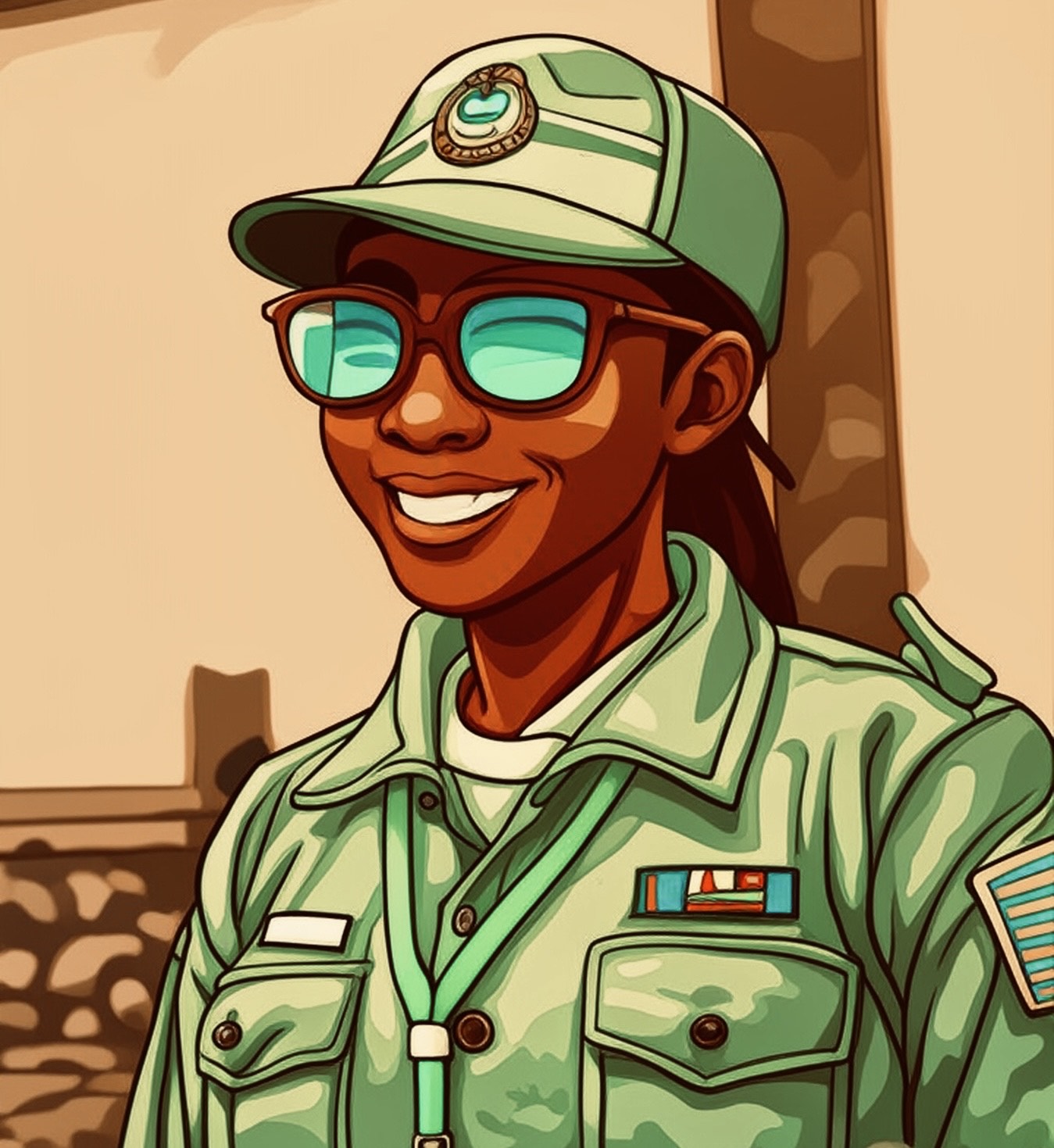A Chronicle of a Girl in Khaki | Minkail Olaitan

l
Your call-up letter came in unexpectedly. Several days earlier, you’d flip through the NYSC portal, as though you were told what you’re looking for is hidden somewhere in the blind area of the website. When your friends call to inform you they’ve just received their call-up letters, you feign excitement and grumble your congratulations to them. Immediately the call ends, you’ll dash into the internet, click the last search, and again, the search for a call-up letter begins on the webpage that could barely hide anything. But you had an impression you were doing the right thing, or perhaps your eagerness has outweighed your reason. Either way, you just want to be identified in khaki, and after 21 days in NYSC camp. You’ll come home to your parents fully kitted—do a little march and stamp your feet as you salute them. You’d cry to show your gratitude for their sacrifices and support so far. Then, later in the day, post everything to build your struggling TikTok page. All along, you’d have told your friend to capture the moments. Your favorite part would be where you stamp your feet on the moldy ground and salute and where they wrapped you in their arms.
ll
When you walked into the orientation camp, you felt different. Thus, you presaged it’s going to be a different experience in there from outside. The officers at the gate confirmed your guess instantly. You were instructed to drop your baggage to one side by a broad-chested man whose guttural voice caught you unaware. You cowered; you were just a girl, and such voices are meant to sow fear in people like you, who can barely hold themselves together. As soon as you are through with the necessary documentation at that spot, you proceed to another spot, beneath a hut-like canopy, where your baggage was checked for contraband. A woman signaled you to stop, and you followed the same routine as those before you—unzipped your bag and pulled out your items one by one. An officer rummaged through every corner of your bag, making you suspect someone had tipped them off about contraband “You can go; welcome to camp,” the officer said freely. You gave a faint smile until the woman who had acted mute earlier quipped, “Make sure you invite me when you want to drink your beverages, you hear?” And you erupted into laughter.
That evening, after you’d gone through the rigorous process of registration and finally gotten your accommodation, you sank into your bed. You picked the top bunk, and below, you have a chubby bunkmate whom you know you’d get to know in the day. As you are about to shut the hectic day behind you, you hear a trumpet blowing fiercely, accompanied by running footsteps and obfuscatory noise and whistles. Every minute you spend trying to figure out what was happening gets the trumpet and the whistle closer to your hostel. It was later you got to know the whole alarm was called beagle, and it would be sounded several times in a day to summon corps members to responsibility, events, etcetera. You leapt out of your bunker and got mixed up in the midst of fellow corps members who were quibbling nonstop as they beat their way through the stairway to the big space that you’ll later know as the parade ground.
You can’t imagine being summoned when you’re already about to sleep. As you block out the noise in your room and prepare to sink into sleep’s soothing embrace, a female soldier’s voice pierces the air like an arrow: “Lights out!” Everyone scrambles to their beds. In that moment, you realize serving your father’s land will challenge you. You recall the camp commandant’s declaration: they will control your time and every aspect of your life. You’ve always managed your time, and someone else dictating it feels invasive. Yet, you know your feelings won’t matter, nor will complaints change anything. Ghosting the camp is the last thing you want; you desire the full experience. Amos, your course mate who had camped in the same camp, has inspired you to ensure you experience it. He kept emphasizing, It’s a one-time experience in a lifetime. The first time he said that, you were one of the bullheaded folks who expressed disinterest. But you later realized what he meant.
lll
The first three days were for you to learn the camp’s rules. Getting familiar with how things are running, repeatedly getting caught for waking up late, and being punished. It’s like finding where you belong in a wide world. You found it hard to believe you’ll see soldiers every day for the next few weeks. The only positive impression you have of the men in khaki comes from knowing soldiers sacrifice everything for the protection of the country. Even then, you have a conflicting view; you’re the type who thinks it will be possible if they can protect without killing. You are against ‘killing,’ regardless of who does it. Death has claimed several people close to you, ones you would have fought death itself to keep—Dolapo, your most loyal friend, succumbed to typhoid, and Uncle Tosin, your irreplaceable favorite uncle, perished in a car crash. You recognize death’s arrogance; it offers no room for repentance, redemption, or reconsideration. It slams doors shut and locks them tight. Thus, you doubt their presence lingers around you, and you must quickly decide to embrace everything in khaki.
One of those cold mornings, as you were rushing out to the parade ground, you felt a firm, gentle pat on your back, and a voice followed through, “Mary, my guy!” You turned and couldn’t believe your eyes. Bailey was in the same camp as you. Bailey used to be your coursemate before he got transferred to Landmark University. But before he left, you had built a fascinating relationship and reached out to each other on social media. One thing that you don’t want to miss about Bailey is his sense of humor and his sprightliness. He’s everywhere. You almost jump on him, but something glues your feet to the ground beneath. Perhaps the people who turned in unison when you shouted his name or the soldiers who whistled and intimidating voices you are still hearing nearby. You both gist in seconds and tell him you connect with him at a certain spot at Mammi Market. Meeting Bailey that morning whisked a great many of your concerns away.
Meanwhile, certain things are just impossible. For instance, there’s no way you’ll rope the shades of people in your hostel in one word. Each person has a distinct personality spiced up with colorful craziness up their sleeves. Your hostel was a confluence of different madness in expression. No one cares about the tribe or religion anyone practices; what matters are the gists, the jokes, the drama and the turning of every funny spectacle into bedtime subject matter. One night, one of the hostel mates declared she’s crushing on her platoon leader, and on another day, another speaks with shocking effrontery that she likes one of her platoon parade instructors. ‘What a platonic madness!” another quipped somewhere in dark zone of the room. You all laughed so hard, and after a while you noticed the laughter wane until it sank into susurrus—then sleep. Those are memorable moments for you. They mean a lot because you still find them amusing as you occasionally laugh at the sheer shamelessness that went into their audacity.
As Amos suggested, you joined numerous activities, but some remained off-limits until the end. You stayed compliant at times, yet the instructors, unrelenting, refused to indulge you. On the parade ground, they halted you due to your persistent missteps. You shifted to martial arts training, where every move sparked uncontrollable laughter. Some nights, before drifting off, you recalled your martial arts instructor—his high-waisted pants and earnest demeanor—and laughed until everyone demanded to know the cause.
IV
A few days before the final day, you met Ellen, a petite young woman from Lagos who studied linguistics in Ghana. She spoke vividly about Ghanaian schools, their flexibility, their supportive environment, and the hospitality of Ghanaians. You felt the urge to tell her about Nigerian institutions, the kind of experiences you had while on campus, and how threatening the academic system and environment were. But you spared her. Since she chose to sell positive narratives, you also cherry-pick the impressive aspects of Nigeria, but the more you pitch it, the more she counters you. You’ve forgotten so fast; she’s a Nigerian also. And she’s impressive. You get along so fast and nicely with Ellen; before parting to your respective platoons, you exchange contacts with Ellen. You said, “You agree Nigerian jollof surpasses Ghana’s, right?” She smiles and replies, “Visit Kumasi soon and decide for yourself.” Her playful disagreement intrigues you.
After a long party night, the final day dawns, and everyone brims with excitement. You eagerly anticipate breaking free from the regimented life that has constrained you. Yet, you acknowledge the journey’s memorability. It seemed like the toughest 21 days of your life, but in reality, those 21 days unfolded with nearly every moment planned for you. You learned, endured pains, met incredible people, faced challenges, and grew stronger. You watched soldiers play volleyball with corps members, share jokes, and forge bonds as cultures blended and people recognized their unity. The experience overwhelmed you. As you left the campsite, beagle sounds echoed, your mind playing tricks on you. When you searched for one word to sum up the experience, you whispered, “crazy.” Still, you feel your country calling you to serve, as everyone now views you as her daughter.







Wow this is eye opening 😍